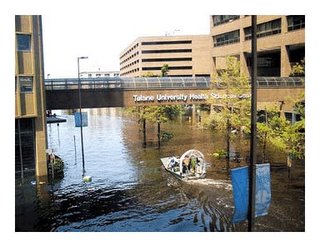
"Seven months after Katrina, health care here remains unacceptably primitive."
The current issue of the New England Journal of Medicine includes an update by two local doctors, Ruth E. Berggren and Tyler J. Curiel, on the desperate straits of health care in post-Katrina New Orleans. In a word, the city's health care system is in terrible shape -- and its growing worse.
"The population of metropolitan New Orleans is approximately 24 percent smaller than before the hurricane, but only 15 of 22 area hospitals are open, with 2000 of the usual 4400 beds. * * * [B]efore the storm, New Orleans had only 3.03 hospital beds per 1000 population, as compared with the average of 3.26 per 1000 for U.S. cities; today, there are 1.99 per 1000.There are chronic shortages of just about everything in the New Orleans medical system except patients -- who are on average quite a bit sicker, poorer, and less likely to be insured. In New Orleans, there aren't enough patient rooms, nurses, anesthesiologists, support staff, pediatric facilities, graduate medical teachers, or medical supplies.
* * *
Many believe that mortality has also increased substantially, although specifics are difficult to obtain — the Louisiana Department of Health is still struggling to complete the compilation of 2005 data. As a crude indicator, there were 25 percent more death notices in the Times-Picayune in January 2006 than there were in January 2005.
Or time. Many of the remaining hospital staff find themselves making long commutes, "sleeping on boats," and enduring a variety of other hardships shared with the general population of hurricane victims, from the lack of schools for their children to the absence of jobs for their spouses. Anyone who was in Pensacola after Ivan can attest that recovering from a major hurricane is time-consuming. And, as it often has been said about being poor in America, it's damned expensive, too.
In the end, as it always does, the delivery of health care comes down to money. One New Orleans clinic is trying to recruit more nurses by offering as much as a 100% "premium" over average salaries. And, we are told, "a huge debate" has erupted among health care providers about whether government subsidies for providing uncompensated care should "follow patients, rather than hospitals."
That's a debate we shouldn't be having. For no better reason than adamantine ideology and historical accident, health care in America generally is tied to your job. No job, no health insurance. No health insurance, no health care.
Ivan and Katrina merely underscore the irrationality of that system, where those who need health care the most are the least likely to have it. As others have long argued in the pages of the New England Journal of Medicine, it's past time we adopted universal health care. Not just for New Orleans. For everyone.







No comments:
Post a Comment